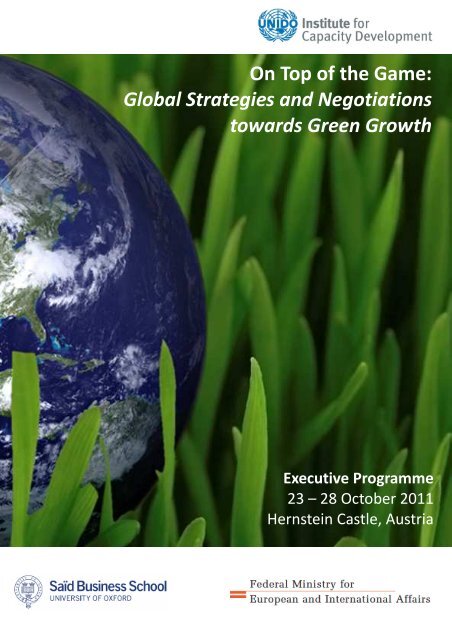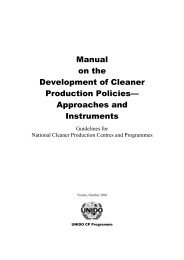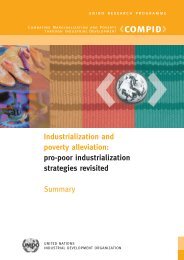Download brochure - Unido
Download brochure - Unido
Download brochure - Unido
You also want an ePaper? Increase the reach of your titles
YUMPU automatically turns print PDFs into web optimized ePapers that Google loves.
On Top of the Game:<br />
Global Strategies and Negotiations<br />
towards Green Growth<br />
Executive Programme<br />
23 – 28 October 2011<br />
Hernstein Castle, Austria
INTRODUCTION<br />
Policymakers and public leaders in developing countries know that leading<br />
effectively through policy reforms, multilateral negotiations and industrial<br />
development programmes is more complex and unpredictable than ever<br />
before. Lifelong learning, therefore, is a requirement for making the right<br />
policy choices, keeping up with the latest research and navigating the<br />
ever-increasing complexity of multilateral negotiations, such as the ongoing<br />
debates on climate change (COP17) and sustainable development (Rio+20).<br />
The UNIDO Institute for Capacity Development has joined forces with<br />
Oxford University’s Saïd Business School to address these needs by offering<br />
executive programmes for public leaders who want to harness their<br />
ingenuity and drive, in order to reshape their countries and create a<br />
prosperous tomorrow. The programmes are designed combining the<br />
highest standards of academic rigour of Oxford University with the vast<br />
industrial policy and technology experience of UNIDO, as well as the<br />
participants’ own experiences in current multilateral negotiations and policy<br />
challenges.<br />
The executive programme of the UNIDO Institute for Capacity Development<br />
is financially supported by the Republic of Austria.<br />
The UNIDO Institute for<br />
Capacity Development<br />
provides training on<br />
key issues pertaining to<br />
sustainable industrial<br />
development. It serves<br />
as a platform for<br />
knowledge creation,<br />
knowledge sharing and<br />
as a catalyst for<br />
innovative solutions<br />
and ideas for<br />
addressing specific<br />
policy challenges for<br />
achieving more<br />
inclusive and<br />
sustainable patterns of<br />
globalization.<br />
l http://www.unido.org l 2
THE PROGRAMME<br />
What does the programme provide?<br />
The programme provides a strategic insight into state of the art analyses and research on developing countries’<br />
options in green growth and energy policy, as well as related green technologies, innovations and multilateral<br />
negotiations. The programme further develops and strategically orchestrates the five key skills of a negotiator’s<br />
tool-kit – thorough analysis; rational decision-making; persuasion; innovation; and implementation – and combines<br />
it with insights on policy positions and options in current environmental negotiations, as well as elaborating policy<br />
options in view of specific (green) industrial development needs in developing countries. It brings together leading<br />
figures from multilateral diplomacy, international business, law, academia and the UN system. Their range of<br />
experience and expertise are unmatched to advance participants’ understanding of the key processes and the<br />
policy space available for developing countries in multilateral environmental and economic negotiations. The<br />
programme avoids rote lecturing and seeks interactivity and intellectually challenging case discussions, exercises<br />
and simulations, all led by world-class academics and practitioners. The dynamic course structure and limited<br />
group size enable participants to interact with both faculty and each other to analyze and resolve individual issues<br />
and concerns. Lively evenings with talks by distinguished speakers will round off the programme.<br />
Who should attend?<br />
The programme “On Top of the Game: Global Strategies and Negotiations towards Green Growth” is designed for<br />
senior negotiators, policymakers and executives from developing countries and transition economies, involved in<br />
multilateral negotiations and important policy decisions in relation to the ongoing debates on climate change and<br />
Rio+20.<br />
Format & Venue<br />
The programme is a 5.5 day residential seminar, located at Hernstein Castle, in the proximity of Vienna, Austria. It<br />
offers full accommodation (single rooms), meals and sports facilities (http://www.schloss-hernstein.at).<br />
Certificate<br />
At the end of the course, participants will be awarded a certificate.<br />
l http://www.unido.org l 3
ADMINISTRATION & FEES<br />
Hernstein Castle, Austria<br />
Programme admission<br />
Admission to this programme is competitive and is based on professional achievement, organizational<br />
responsibility and involvement in the relevant negotiations and preparatory activities towards Rio+20. There is no<br />
formal educational requirement, but fluency in written and spoken English is a necessity for the programme. Early<br />
application is encouraged. Qualified candidates are admitted on a rolling, space-available basis. Due to the senior<br />
level of the participants and the interactive nature of this programme, the number of participants is limited to a<br />
maximum of 30. Applications received after the deadline will be considered only if space is available. To apply to<br />
the programme please use the attached application form and return it to unido-institute@unido.org. Deadline for<br />
applications is 16 September 2011.<br />
Programme fees<br />
The programme fee is USD 6,200. This includes tuition, training material, accommodation and meals. All other<br />
expenses (e.g. travel and visa cost) are not covered by the programme fee and need to be borne by the<br />
participant. Applicants from developing countries may apply for financial support by UNIDO’s capacity-building<br />
facility. Applications for this facility should be indicated on the registration form.<br />
l http://www.unido.org l 4
Benefits<br />
At the end of the course, participants will be better equipped to<br />
√ Analyse complex negotiation situations, with a particular focus on multilateral negotiations in<br />
the field of green growth, to determine the interests, processes and relationships that might<br />
lead to fruitful, sustainable agreements;<br />
√ Develop and excel in the five skills of negotiation (information-gathering, decision-making,<br />
persuasion, innovative thinking and implementation/enforcement);<br />
√ Gain an enhanced understanding of the challenges of green resource-efficient industrial and<br />
economic growth and how to address them;<br />
√ Identify and avoid costly errors in own thinking habits and those of others;<br />
√ Use persuasion at the table, and operational capacities beyond the table, to alter situations<br />
and re-frame issues in ways that support specific goals and plans;<br />
√ Understand the roles that mediators and third parties can play in negotiations;<br />
√ Acquire a better understanding of how people approach negotiations in different cultures.<br />
OVERVIEW TIMETABLE<br />
Date Time Lecturer/Speaker Description<br />
Sun, 23 11:00 - 13:00 Transfer from Vienna International Airport to Hernstein Castle - Registration<br />
October 16:30 - 17:00 Orientation at Hernstein Castle<br />
Mon, 24<br />
October<br />
Tue, 25<br />
October<br />
Wed, 26<br />
October<br />
Thu, 27<br />
October<br />
Fri, 28<br />
October<br />
18:00 - 18:30 K. Yumkella Introduction: Current global strategies and the negotiations towards Green Growth<br />
18:30 - 19:15 H. Winkler Multilateral diplomacy in times of climate change and sustainability negotiations<br />
08:30 - 09:30 H. Leuenberger Global economic trends and the current “green” negotiations: From the<br />
scientific facts to the political agenda at Rio+20<br />
09:30 - 12:45 S. Roberts Negotiation: A comprehensive, research-based approach<br />
13:45 – 17:30 Understanding increasingly complex negotiations<br />
17:45 – 18:45 S. Son The Korean Experience: Policy options and policy space for developing countries in current multilateral<br />
negotiations on sustainable development<br />
08:30 - 12:45 G. Orren Persuasion in Negotiation: Analysis of Persuasion and Influence<br />
13:30 - 18:00 M. Gates Negotiating successfully across cultures<br />
18:00 - 19:00 M. Bazilian Learning from experience: Positions and national interests in the global energy agenda<br />
08:30 - 12:45 T. Cullen The high cost of low-trust and ethical considerations in negotiations<br />
13:30 - 14:45 T. Altenburg -<br />
A. Alcorta<br />
The Greening of Industrial Policy: Concepts and Challenges<br />
15:00 - 17:30 P. Low<br />
"Trade and Climate Change - with lessons from past trade negotiations on how developing<br />
countries can achieve their goals"<br />
17:30 - 18:30 (Movie) “The Bank, The President, and the Pearl of Africa” - Tug-of War<br />
19.30 - 20.30 Discussion of the film "The Bank, The President, and the Pearl of Africa"<br />
08:30 - 10:45 T. Cullen Further development of negotiation principles - an interactive teaching session<br />
The Semaht River Negotiation - a two team simulation<br />
11:00 - 12:45 O. Darbishire Advanced decision-making, groupthink and other hazards<br />
13:30 - 15:30 Carter Racing<br />
15:45 - 18:00 O. Darbishire -<br />
H. Leuenberger<br />
Multi-party and multi-issue negotiations: The case of Rio+20<br />
Evening lounge<br />
talks<br />
E. von Weizsaecker -<br />
S. Si Ahmed<br />
From science to governance: Sustainable development strategies for developing countries at Rio+20<br />
negotiations<br />
08:30 - 13:00 T. Cullen Interactive teaching session, reinforcing concepts of logrolling, no-deal options, contingencies,<br />
sequencing etc. – recapping on lessons learned throughout programme<br />
14:00 - 15:00 T. Cullen - S. Roberts Concluding recap of lessons learned and open discussion of negotiation<br />
challenges<br />
15:00 - 15:30 W. Lütkenhorst Concluding remarks and certification ceremony<br />
15:30 Transfer to Vienna<br />
l http://www.unido.org l 5
FACULTY<br />
Augusto ALCORTA, Director, Development Policy and Strategic Research Branch, United Nations Industrial<br />
Development Organization (UNIDO)<br />
Tilman ALTENBURG, Head, Department for Competitiveness and Social Development, German Development<br />
Institute (DIE)<br />
Morgan BAZILIAN, Special Adviser to the Director-General on Energy Issues, UNIDO<br />
Tim CULLEN, Programme Director, Saïd Business School, Oxford University; Senior Associate Member,<br />
St. Antony's College, Oxford University; Managing Director, TCA International Policy Management<br />
Owen DARBISHIRE, Abraham and Henrietta Brettschneider Scholar & Rhodes Trust University Lecturer in<br />
Management Studies, Saïd Business School, Oxford University<br />
Michael GATES, Group Managing Director, Richard Lewis Communications<br />
Heinz LEUENBERGER, Director, Environmental Management Branch, UNIDO<br />
Patrick LOW, Chief Economist of the World Trade Organization<br />
Wilfried LUETKENHORST, Managing Director, Strategic Research, Quality Assurance and Advocacy Division,<br />
UNIDO<br />
Hans WINKLER, Director, Diplomatic Academy Vienna<br />
Gary ORREN, Professor of Public Policy and Management, Harvard Kennedy School<br />
Sherman ROBERTS, Academic Director, Oxford Programme on Negotiation, Saïd Business School, University of<br />
Oxford<br />
Sidi Menad SI AHMED, Director, Montreal Protocol Branch, UNIDO<br />
Sung-Hwan SON , Ambassador for Climate Change, Ministry of Foreign Affairs and Trade, Korea<br />
Ernst Ulrich VON WEIZSAECKER, Advisor, German Foundation for World Population; Dean,<br />
Donald Bren School of Environmental Science and Management, University of California<br />
Kandeh K. YUMKELLA, Director-General, UNIDO<br />
l http://www.unido.org l 6

















